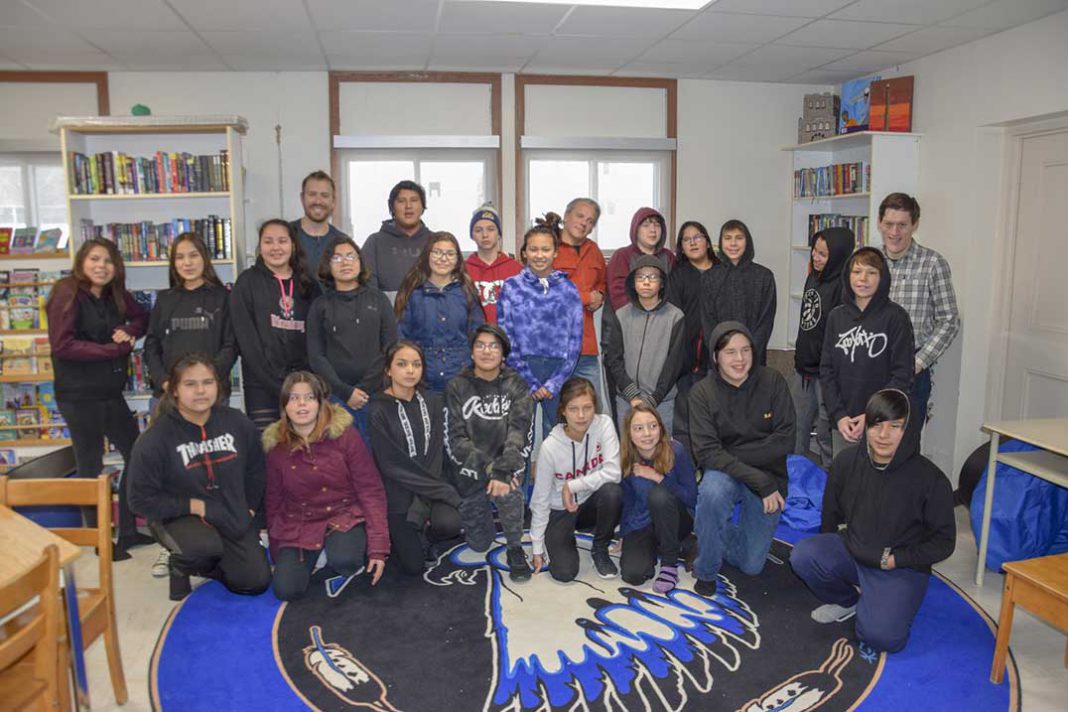WIIKWEMKOONG—Renowned author and playwright Drew Hayden Taylor is no stranger to Manitoulin Island and Wiikwemkoong, in fact his first play, ‘Toronto at Dreamer’s Rock,’ was commissioned by Debajehmujig Storyteller’s Larry E. Lewis. Mr. Taylor dropped in to visit the Grade 8 classes at Pontiac School in Wiikwemkoong and spent the evening interacting with the community at a community feast later that day.
Mr. Taylor was born in Curve Lake First Nation (where he currently resides) and describes himself as a “contemporary storyteller.” A scan of his bibliography runs the gamut of genres, from fiction to non-fiction, fantasy to contemporary drama; this is a writer one cannot easily be roped into any defined literary corral, although he does admit that looking back on his career he has been steadily engaged in “indigenizing genres.” His book about an Anishinaabe vampire, ‘The Night Wanderer,’ is currently being studied by the students of Pontiac teachers Camyron Beaudry and Myles Ryan Grade 8 classes.
Growing up on a small rural Ontario reserve lying about 25 kilometres northeast of Peterborough, Mr. Taylor describes himself as coming from a very large family, despite being an only child. “When I was born I was 11 pounds, four ounces,” he explains to his rapt audience of Grade 8s. It was an experience he believes his mother was not in a hurry to repeat.
Still, with an extended family of aunts, uncles and innumerable cousins, Mr. Taylor’s home community of Curve Lake First Nation has provided a myriad of rich veins to mine in his writing. Asked by one student where Otter Lake First Nation (the fictional site for many of his works) can be found, Mr. Taylor admitted that community is largely a fictionalized version of his own community.
“I discovered later that there are actually a lot of Otter Lakes in Ontario,” he said. But he stressed that the Otter Lake of his works of fiction is geographically located within his own head.
Family, community and his own rich imagination have culminated in a host of books, his 32nd novel is currently to be found on store shelves and his latest play (two currently hitting the stage), ‘Cottagers and Indians,’ starts onstage at Toronto’s Tarragon Theatre February 4 through February 24. ‘Cottagers and Indians’ explores the collision of Indigenous cultural and traditional renewal practices with the interests of non-Native cottagers. Mr. Taylor explains that the inspiration for the work came about from the interactions of cottagers near his own community during the reintroduction of wild rice in local lakes that was objected to by cottagers who were looking for “an undisturbed summer getaway.”
Mr. Taylor notes that “there are no real heroes or villains in a story like this, only people trying to look after their families.”
Mr. Taylor has walked an interesting path through his life. As the son of a Caucasian and Ojibwe parent, he jokes that he is an “Occasion,” in fact, something of a “special Occasion,” he admits.
But having grown up on the rez, he makes no bones about where his storytelling bones were formed, although his sojourn as a long form novelist came as a bit of a surprise.

“I always thought I would be a playwright,” he said. “I come from a community with a long oral culture.” Some of Mr. Taylor’s fondest childhood memories revolve around sitting beside a blazing bonfire as his family members and friends shared tales.
He recalled being a five-year-old sitting on the family porch with a lap full of comic books. “I remember thinking ‘wow, next year I get to go to school and I will be able to read these’.” Mr. Taylor said that he loved to read. “Part of it probably comes from the fact that there wasn’t a lot to do on my rez.” Books opened up a host of worlds for the eager young man to explore. “The more I read, the more I decided I wanted to be a writer. It was in writing that I could do all the things I didn’t or couldn’t do in my own life,” he told the students. “I am 1,000 years old; I was born just after the discovery of paper.”
That might be a bit of poetic licence. Mr. Taylor was born July 1, 1962. “I grew up before the internet, before there were computers.”
Mr. Taylor’s writing career was derailed early on, as he explained to the students in an anecdote. His Grade 11 teacher told him “no, not really,” when he asked the teacher if he could make a living as a writer. “The only thing worth remembering from this story is to never believe anything your Grade 11 English teacher tells you,” he laughs.
Mr. Taylor went into post-secondary studies in radio and television broadcasting. This quickly proved to be a tricky path as the young Drew Hayden Taylor was terribly shy. He described bashing his head against the archway in his family home until he was black and blue so that he did not have to go to school and deliver on a public speaking assignment. “I wouldn’t counsel this approach to anyone,” he said. “But it made my point to my teacher.”
Judging by his numerous speaking engagements, and judging by his apparent comfort level with the Pontiac students, it is a phobia he has since largely overcome.
With many brilliant people telling him not to pursue writing as a career, Mr. Taylor wound up taking on many different jobs on contract. “The only real ful-time job I ever had was as the artistic director of a theatre company (Toronto’s Native Earth Performing Arts),” he laughed.
He worked on CBC’s ‘Beachcomber’ series (the replacement for Manitoulin’s own Rainbow Country) and the more contemporary ‘Spirit Bay’ filling at one point the role as an Indigenous culture advisor—“they would give me a script to read and ask ‘is this accurate?’ because, after all, Native people in Peterborough experience the same as Native people in Newfoundland. ‘Yes, Native people eat toast,’ I would tell them.”
He wrote a script for ‘The Beachcombers.’ “It was terrible,” he laughed. But Debaj’s Larry E. Lewis asked him to write a play for the company, which Mr. Taylor was reluctant to accept.
“Larry said ‘I will give you $800.’ So I asked him ‘when do you want it?’,” he recalled. “The first rule of the freelance writer is ‘never refuse a cheque’.”
Although he freely admits that growing up on a reserve his grasp of the minutia of the English language is not up to Canlit standards, “I can’t tell you the difference between split infinitive and a dangling participle,” he has a simple solution to that. “I have white people to do that for me.”
His first novel was courtesy of a large advance from a publishing company. “I was extremely happy until I realized that I had signed a legal contract to deliver 50,000 words. I was pretty sure I didn’t know 50,000 words.”
Like a great number of writers, Mr. Taylor procrastinated until he had no other projects to complete. Once he got underway, however, he wrote seven words on a blank page: ‘The Night Wanderer’ by Drew Hayden Taylor. “Only 49,993 to go.”
With a pace of 1,500 to 2,000 words a day, Mr. Taylor found himself hooked on the characters and story that was unfolding on the pages in front of him. Soon the word tally faded from his consciousness and his first draft tallied in at 61,000 words. “There is no such thing as a good writer,” he said, “only a good rewriter.” When it was complete ‘The Night Wanderer’ tally was in the 70,000 words range.
Mr. Taylor discussed his creative challenges with the Grade 8 students in writing an Indigenous vampire novel, not least of which was the lack of the vampire tradition in Anishinaabe culture. The solution came when he realized that it was common for early European visitors to North America to take Natives back with them to be displayed like animals in a zoo. Then it was just a challenge to bring him back home a few hundred years later.
In the question period following his talk, Mr. Taylor found himself challenged by a number of the students’ questions, particularly those centring on the motivations of his characters. “It’s been a very long time since I wrote that,” he laughed. But he still engaged with the students in conjecturing what his characters were thinking and feeling at the time.
Mr. Taylor noted that while “Native” stories are all the rage in today’s literary market, the same could not in any way be said of when he started three decades ago. But at the core, he simply likes telling stories. He said that he finds inspiration in just about everything around him. “It is easy to be inspired,” he said.
Mr. Taylor has a number of published books and articles whose themes are mined from his mixed heritage. Those include works such as ‘Funny you don’t look like one’ and ‘Further Adventures of a Blue-Eyed Ojibway: Funny, You Don’t Look Like One #2, #3 and #4.’
His joke, “Why do Natives hate snow? Because it’s white and is all over our land,” may have drawn nervous titters from his audience, but illustrates well his head-on approach to contemporary Native life on Turtle Island.
“What is your favourite food your mother made you?” asked one student. “Apple pie,” was the author’s instant reply.




